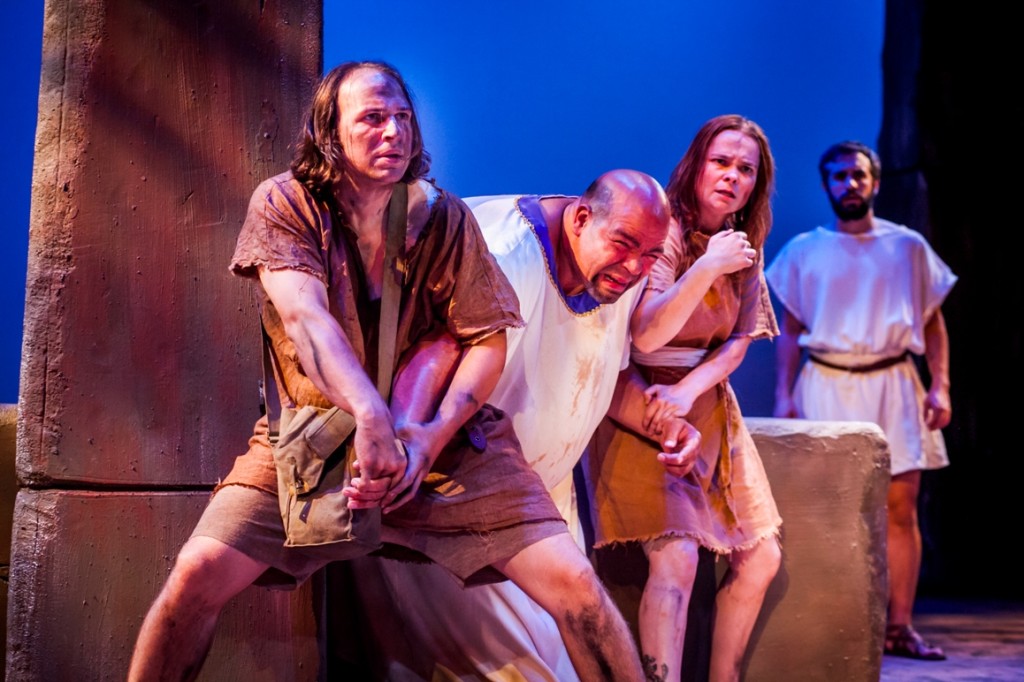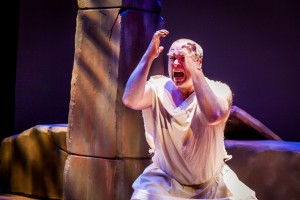“Sing, Goddess, of the rage of Peleus’s son Achilles,
the accursed rage that brought great suffering to the Achaeans.”

Taking his title from the opening lines of Homer’s Iliad (ca. 750 BC), playwright Paul Parente explores the events, emotions, and moral dilemmas from the last days of the decade-long Trojan War in RAGE OF ACHILLES, a world-premiere tragicomedy for Commonwealth Classic Theatre Company. The millennia-old themes, derived from one of the greatest epics in world literature, are given a provocative, smart, sometimes absurdist, and sometimes horrific re-envisioning from the worms-eye perspective of two ancient Greek spies faced with life-and-death decisions: should they choose compassion over violence, forgiveness over murder and destruction, or perpetuate the bloody vengeance that is honored by their culture, even if it means that they themselves become their homeland’s sacrificial ‘heroes’? Cousins Dimitri (Adam Altman) and Thano (Charlotte Northeast) represent the lowly Everyman, serving as grime-covered spies in a war that is “never over” and that raises both the personal and societal issues with which they grapple.
There’s a lot going on here, and while a basic knowledge of Homer’s classic tale and characters that inspired RAGE OF ACHILLES is useful, you don’t have to be a scholar of ancient history to get its message loud and clear. Interweaving Homeric-style verse with contemporary American vernacular, and passages of obviously ridiculous comedy with episodes of shockingly heinous violence, Parente’s original script—this is not an adaptation of the Iliad–emphasizes the universal absurdity and tragedy of war at any time, be it Antiquity or the present. The power of words to convey an antiwar sentiment is gravely employed through the device of a masked Greek chorus of death (led by Brian Anthony Wilson) and sharply expressed by the uncertain herald Talthybius (Eric Scotolati), who paradoxically praises the glory, not the truth, of war, to give immortal fame to those who perform its violent acts and to convince a gullible public of its questionable values (when Thano advises Talthybius to “make it up,” he responds “I do”).

Directed by Damon Bonetti, Wilson (who not only leads the macabre chorus, but also portrays a defeated Priam, King of Troy) and John Lopes (as both kings Agamemnon and Menelaus) bring an imposing tone of classical gravitas to their roles. Nathan Foley in the title role displays the eventual change from Achilles’ rage to his humanity, and Anna Zaida Scannell Szapiro (as the slave Briseis) provides the soft, sensuous, and loving touch that the warriors so desperately need. Altman and Northeast, and J Hernandez (as the opposing Trojan spy Dius, with whom they have a mutually beneficial pact until they don’t) combine the play’s opening humor with increasing urgency and self-revelation.
An archaizing scenic design (Meghan Jones), props (Molly Warnken), masks (Jillian Rose Keys), costumes (Rosemarie McKelvey), and hand-to-hand combats (fight direction by Ian Rose) evoke the pre-classic era of the Trojan War, and dramatic lighting (Dominic Chacon) effectively brings focus to the characters, times of day, and mood shifts, from the initial détente of the spies (blue) to the ultimate blood-thirst of the combatants (red). While some of the extended scenes of buffoonery and killing could stand a bit of tightening, RAGE OF ACHILLES is a potent reminder that there’s “no glory in dying like that” because the reality of war is not “like a story.” [Drexel University’s URBN Center Annex Black Box Theater, 3401 Filbert Street] August 6-22, 2015; commonwealthclassictheatre.org.
